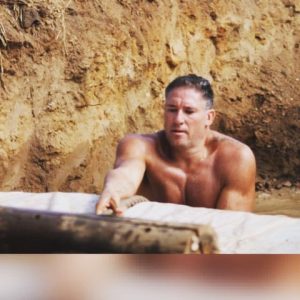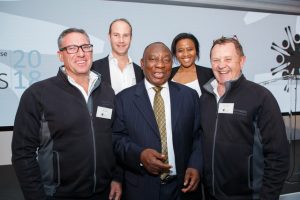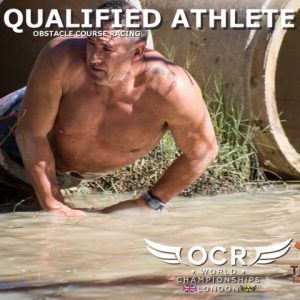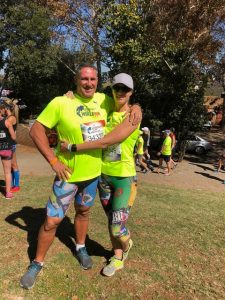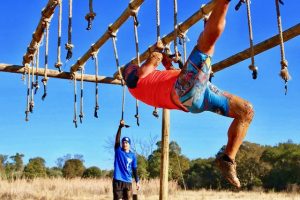
Crossing ropes, no feet allowed after crawling 100m through the mud. Stretching to kick the bell to complete that obstacle.
Jason Fritz from Multi-Media has been invited to participate in the OCR World Championships, a demanding event to be hosted in England from 19 to 21 October 2018. Obstacle course racing takes competitors through a grueling race, in many ways similar to military training, ultimately testing stamina and strength. DWR asked Jason a few questions about the sport and his involvement in the upcoming competition.
Working in our industry, how do you fit the hours required for training?
I train 6 days a week with 2 double sessions per week. Mondays are normal off days, Tuesdays to Fridays I’m on the road by 5am latest. Tuesday and Thursday mornings are double sessions consisting of runs anywhere between 8 -12km from 04h30 60 -06h00, followed by strength sessions with a squad coach from 17:00pm to 18h30. Wednesday afternoon is a 6km sprint run straight into grip training with obstacles. Friday mornings is an hour Wattbike session. Saturday is a 6km warm up run at 06h30 straight into full body strength and obstacles session ending at 09h30. Sunday is a long run that needs to be over within two hours consisting of a trail run between 12 to 21km (hard terrain). Sleep and repeat, but distance and speed work changes weekly.
What made you chose the OCR World Champ race?
There are many obstacle races around the world, but with the OCR World Champs you need to qualify in order to be invited to represent your country and age group. So, this makes it way harder to go to OCR World champs opposed to Spartan World Champs.
How did you get into this sport?
I was a sporty child, played loads of tennis between the age of 6 and 18 years competitively, swam in provincial galas and played golf on Sundays with my Gran. Then I found the love for lighting and the entertainment industry and forgot all about sport. At the age of 34, and 145kgs heavier (hence the nick name ‘Fatboy’), I decided I needed to get fit again. I started gym and a little diet, but this was not enough to motivate me to get fitter. I had a friend who wanted to take some of her students on a team building exercise, and I suggested the Warrior Race – that was just over five years ago. My friend signed up her twenty students for the race on condition that I would run with them. I have never looked back and from that day, all I’ve wanted is to find every OCR (obstacle course race) possible in Johannesburg!
How important is nutrition to you in your training and for race day?
When I was training and competing in races I was still eating what I wanted and all the wrong things. As soon as I was told that I had qualified for the World Champs, all that changed. I went to see an endurance dietitian who has transformed my eating completely. She is also a top athlete and understands hectic training programs. All I can say is that there is a huge difference when knowing what to eat for what type of training or race/distance you will be competing in. The energy levels are way better, recovery time is halved and you sleep better. So yes, nutrition plays a huge part.
Which is the toughest obstacle you’ll face on the route and which is your favourite?
The toughest for me is always the running. I’m a big guy at 100kg running against guys who are 70-85kgs. Where I make up huge time is on the heavy carries (50kg sand bags/logs up 30-40 degree slopes for 1km). I also love all the upper body hanging strength stuff.
What helps you get through the dark patches?
Going to those dark places or patches in your head while racing is a good thing as it teaches you lessons. It’s knowing I have a loving wife who plays a huge part in my training (being an athlete herself) … her support gets me through and coming home to her is the best thing after a race, or seeing her on the side-lines, cheering me on.
